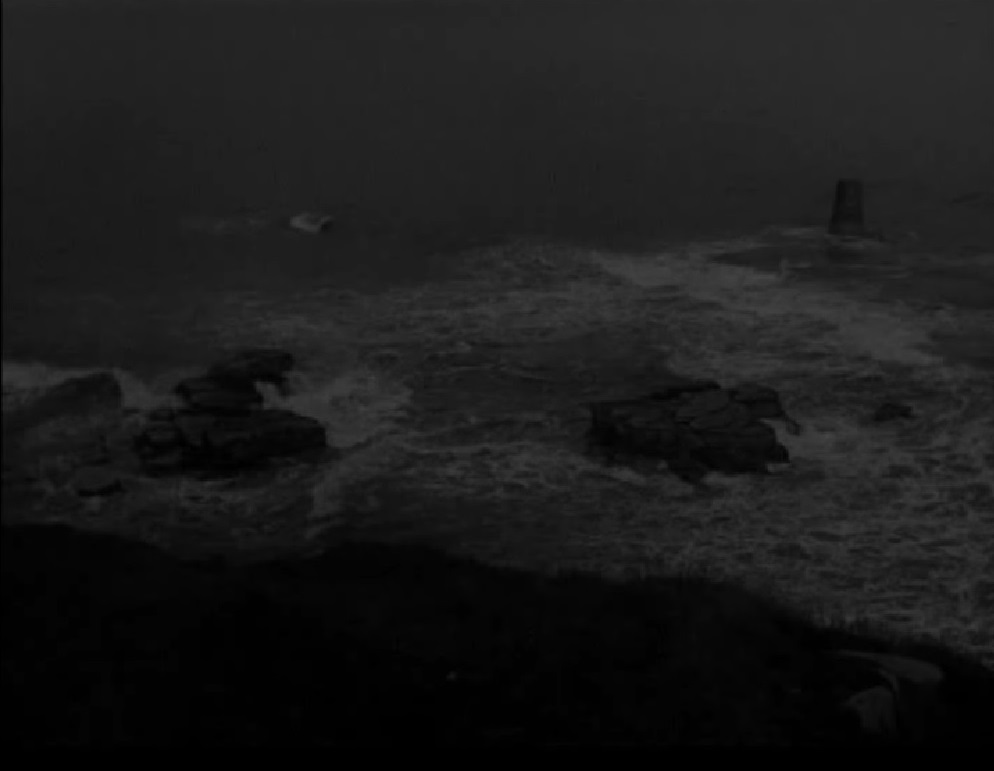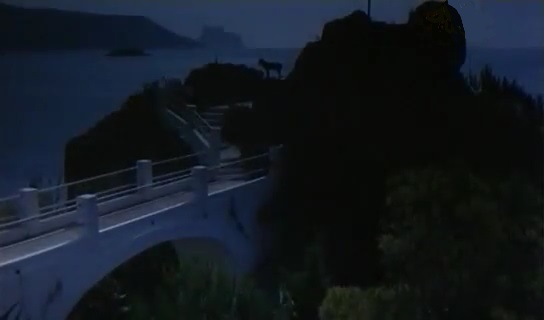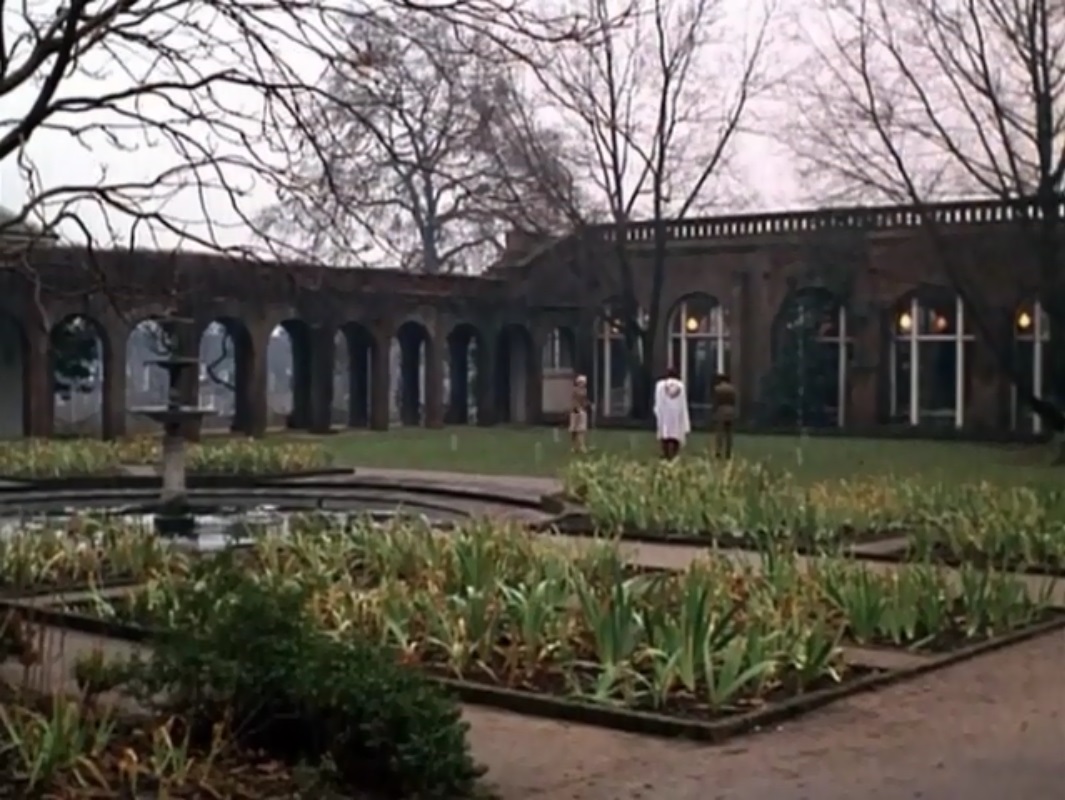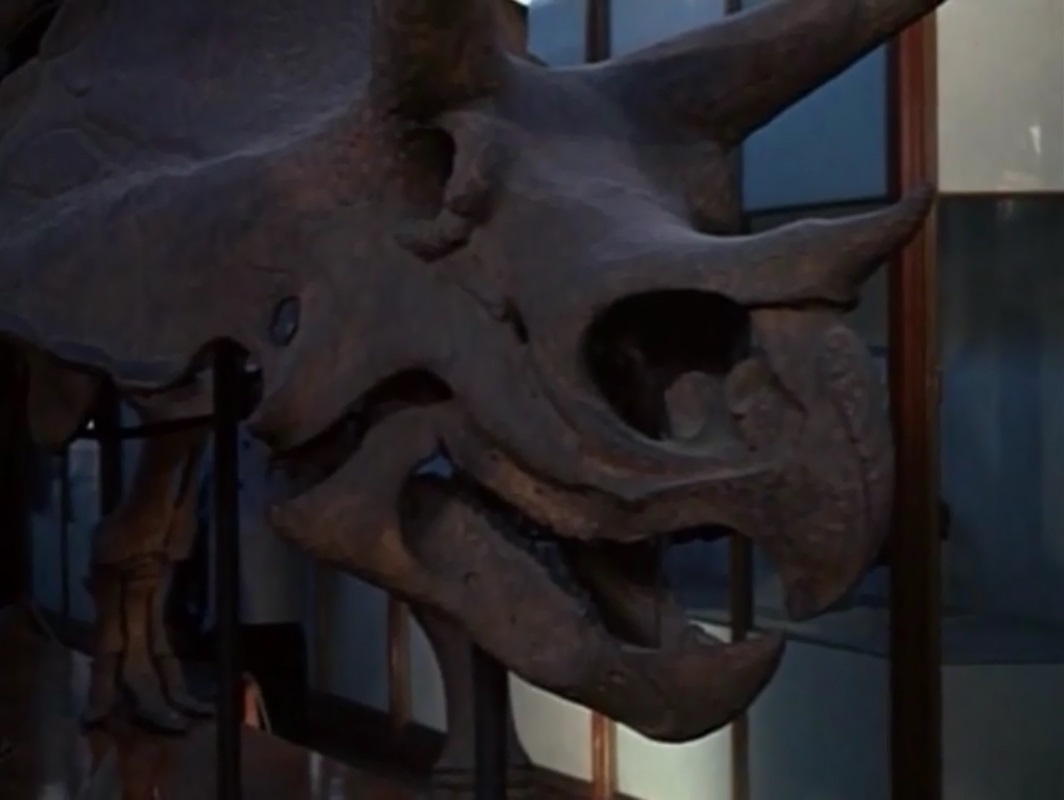The Bells Go Down
A central theme
at Ealing is formulated at great length, it runs through the entire film and is
clearly stated only at the end, whence it is picked up in Crichton’s Hue and Cry, probably just the Cockney
in his proper nest under the ‘en, “safe as ‘ouses.”
“Well,
they aren’t s’ safe these days.”
A
poem on the Blitz like one of Eliot’s.
George
Perry’s hatchet job (Forever Ealing)
gives the palm to Jennings and repeats Halliwell’s slur against Wyler, an
absurdity. Variety thought the
Jennings “more legitimate in that it was portrayed by actual members of
the service,” a damnable heresy from that organ. The BFI in like wise,
compared to Jennings “the realism goes only so far.” Halliwell’s Film Guide, “a
good record of the historical background of the Blitz.”
The
structure is notably streamlined as Cyril Frankel’s On the Fiddle.
Dead of
Night
A masterpiece of
masterpieces executed by Dearden, Hamer, Crichton and Cavalcanti on a simple
theme, “reconstruction job, old farmhouse in Kent.”
Subsequent
analysis down to the last detail and nuance a hundred thousand times over
extends in all directions as far as Roeg’s Puffball.
The
Captive Heart
An elaborate
response to La Grande illusion,
with the benefit of hindsight. There’s a lot of fine work in the
directing, with an independent use of the camera in a subtle counterpoint, or
orchestrating large-scale movements, as in the prisoners’ stiff-legged
shamble to the loudspeakers during a propaganda assault, followed by
Dearden’s establishing sequence, a long track to Cpl. Horsfall, pause and
response, countermovement, dolly, final frame.
There are a
couple of extraordinary things in it, a very quick citation of
Hitchcock’s blackface slow crane, and at the very end a foreglimpse of
Resnais’ Nuit et brouillard.
It must have
seemed so obvious that The Best Years of Our Lives was absolutely
unique, though it comes from and extends a long line of formal development, and
yet The Captive Heart finds the very same solution (though from a
slightly different angle, and played much closer to the vest), and was released
the very same year.
The essential
difference, insofar as one may be said to exist, is that the peculiar formal
problem suggested by Wyler’s film is compounded into a flat surface
allowed to irrupt into the character of “Mitchell”, not to put too
fine a point on it. Surrealism is a sort of economy in terse times, and who had
time to explain things in 1946?
The war is so
long (1914-45) that Mrs. Horsfall’s hair goes white, but Mrs. Evans gives
her all not to let her husband down this time, he has a daughter.
The
pianist-composer is given cause to doubt conditions at home, they are the same.
The blind Scotsman is made to understand this as well.
The Czech captain
who grew up at the embassy in London and became a professor of English at
Prague University went to Dachau and escaped and is now Capt. Mitchell as a
ruse to evade the Gestapo, there is a wife in England forsaken by him, and
children, though he is another man.
“Does not
attain the stature” of Renoir’s film, A.W. wrote in the New York
Times, but “intelligent, trenchant fare”. Variety found
“newsreel fidelity”, Tom Milne of Time Out Film Guide a
“decent, plodding attempt”.
Saraband
for Dead Lovers
The film is
certainly ten and easily twenty years ahead of its time, as this is precisely
the same raft of despair seen in Richardson’s The Charge of the Light
Brigade.
Hanover’s
army is sent in vain against the Turk to win the English Parliament to the
succession of King George I.
The tale is told
by the wife he married for money and later forsook.
The Swedish Count
who observes the battle is killed because of a liaison with her.
Dearden’s
Ealing drama shows, in the Carnival sequence, an affinity with Powell &
Pressburger. The Technicolor was praised and dispraised like the rest of it, Variety
and the New York Times being particularly unimpressed.
Robson as Platen
observes Granger as Königsmark at her feet, young and handsome, his face in the
sweat of death. She pities him, he utters the name of the other one, she kicks
him viciously, he dies.
The Blue
Lamp
Ealing’s
finest solve the Cinema Murder case.
To be fair,
Clarke had help from Mackendrick and others.
Such views of
London only Ealing could provide.
Pure Ealing,
Dearden’s masterpiece, out-Hitchcocking Hitchcock at the dog track.
Cage of
Gold
Two assaults upon
England from the Continent, the first marries and mates, the second dies the
death.
The title is a
nightclub in Paris, La Cage d’or, headquarters of a smuggling ring,
diamonds, currency, gold, and scene of a Casablanca parody, the
barman’s name is Sam, etc.
“Not only
disappointing but downright annoying” (H.H.T., New York Times).
“Middling Ealing thriller” (Geoff Andrew, Time Out Film Guide,
Halliwell has “mild mystery melodrama”).
Pool of London
Merchant seamen,
one American, one Jamaican, aboard a Dutch freighter, the Yank’s a dab
hand he thinks skirting customs.
There are shades
of Oliver Twist in this, as perhaps in any “routine
semi-documentary police thriller” (Halliwell’s Film Guide),
the striking allusions to Hitchcock’s Blackmail and Murder!
entirely escaped critical notice in “a film which, though not
distinguished, is entertaining” (Bosley Crowther, New York Times)
though it “goes off at various tangents” (Variety) in
“what passed for a realist view” (Time Out Film Guide).
Vernon the
Gentleman Acrobat plans the big caper, his act’s not esteemed on the
music halls, there’s diamonds in a safe to be had, a crime ring to
bolster him, the Yank to get the stuff aboard, and himself to start off leaping
from roof to roof, he tells his brother George.
The Jamaican
carries the odd item or two down the gangplank as a favor, accepts no payment
but the price of a drink, perhaps. Customs is strict, the watchman is killed,
the city’s not much of a place for a hand who isn’t dab, nice girls
have their friends, the other kind want your dough.
Richard Mallett
in Punch (cited by Halliwell) speaks of “imagination, humour and
visual attractiveness” that of course includes the great Ealing views of
London sometimes noted.
The Gentle Gunman
An Englishman and
an Irishman debate the question over chess, meanwhile the Irish Republican Army
plant bombs in London tube stations during the Blitz, one of its members has
begun to see the ridiculousness of the situation and forestalls a suicide
mission to liberate the arrested bombers in Belfast.
The New York
Times reviewer saw “lack of motivations”.
The BFI,
“fudges the issues... conventional pieties...”
Time Out Film
Guide, “stiff,
overplotted... generalised, wet humanism...”
Halliwell’s
Film Guide, “stilted and
unconvincing...”
George Perry, Forever
Ealing, “far too glib and unconvincingly examined... stagey and
plodding... naivety... failure...”
The position of
the title character, that Ireland is a nation and not a gang of thugs, does not
appear to have impressed reviewers for all their fudged pieties, etc.
A certain
resemblance to Michael Anderson’s Shake Hands with the Devil will
be noted.
The Square Ring
A fight card from
a trainer’s standpoint, six bouts with an intermission for “beer on
troubled waters”, two old pugs down and out, two victims of circumstance
in the boxing racket, two breezy winners.
The standards of
glory at Adams Stadium somewhere in England.
A remarkably
little-known film.
The Ship
That Died of Shame
MGB 1087 of the
Coastal Forces, decommissioned after the war and picked up by members of her
crew for cross-channel smuggling operations that tie in with the mob and sink
her.
Crowther of the New
York Times was frankly incredulous, but gave it the benefit of the doubt.
Later critics,
following his example, have not followed his argument, such as it is, and have
emitted fatuities instead.
Wyler’s Mrs.
Miniver for the bombing raid, Huston’s Key Largo for the
central drama, Fleischer’s 20000 Leagues Under the Sea for the end
of the bedraggled motor gun boat.
Who Done
It?
Birth of a
private detective in the former offices of a theatrical agency, following on
the spectacular Wembley Pool disaster of Tropical Nights on Ice, a
skating musical comedy.
Malentendu, hired as a double for Stumpf, German scientist
working in America but secretly a Uralian sympathizer, his device is a means of
controlling the weather, amply demonstrated at the Royal Scientific Society.
Dr. Broznik is to
transmit the microfilmed working plans to Uralia from a trade show of the
latest radio gear, using his invention that carries still or moving pictures
beyond the range of television signals.
Scotland Yard and
a girl with extraordinary physical strength, a client of the agency, are in it.
Hill and Lee for
Balcon at Ealing, screenplay by Clarke, cinematography by Heller.
There is a
frightful complexity in the gags, they are all redolent with associations and
aliquots, Dearden’s style brushes off all difficulties and proceeds
directly at a speed in measure with this manner of expression.
Frears’ Gumshoe
is an echo.
The Smallest Show on Earth
The meek inherit,
after the disaster represented in The Blue Lamp, the cinema murder.
The local media
giant is not above spiking the projectionist, that’s just the way of it.
That, however,
calls out an act of resistance. The local media giant’s house burns right
down to the ground.
The art of cinema
is primarily understood by Dearden and his writers as pertaining to the senses
and the emotions, but the films shown at the Bijou Kinema have no trouble
following the plot.
The cat still has
her kittens there, in Sloughborough, Warks.
Violent Playground
The cinema murder
is again mentioned, among the detective sergeant’s accomplishments.
The title is the
city (Liverpool) where children play, and the Scotland Road School in the
finale (which Variety found “overlong”, the rest “an
absorbing film”).
“The cinema
was our academy and our cathedral.” (John Osborne)
Halliwell’s
Film Guide says it’s
“enervatingly dull until the siege climax.”
Sapphire
The murder of a
young music student in London, a case not solved, as the superintendent says,
only picked up by its various pieces.
The girl is half
black, which provides for a variegated glimpse of social life down amongst the
lowest, even, and nearly to the point of murder. She was passing for white, and
that gives another perspective entirely, the motive for her murder as well.
A Dearden
specialty, efficient police work.
BAFTA, Best
British Film.
B.S.C., Best
Cinematography Award.
Edgar Allan Poe
Award, Best Foreign Film.
The complex
intricacy of the structure proved too much for the British Film Institute,
which finds the various arguments sophomoric attitudinizing by the filmmakers,
a simple mistake.
A.H. Weiler rose
above himself in the New York Times to some extent, Variety
shared his blunder, however, in assuming without further reflection that the
film “ducks the issue.”
Time Out Film
Guide like the BFI could not
follow the affair anywhere nearly so skillfully as it is laid out (Jonathan
Rosenbaum in the Chicago Reader is aware of the film as
“neglected”). Halliwell’s Film Guide rates it rather
highly.
The League of Gentlemen
Cashiered army
officers, all crooks and losers, are recruited to rob the City & County
Bank Limited.
The mastermind is
a “redundant” half-colonel who rises from the sewer in evening
dress for the opening sequence like Harry Lime with a happy ending.
They rob an Army
Supply Centre for arms and make it look like an IRA job.
“Noxious,
blinding gas” and an explosion to knock out communications as well as
alarms and a wireless jammer let the robbers filch old currency being delivered
in a trice, Eastcheap has a fog so thick that gas masks are required and worn.
They are like
critics, the gentlemen asked early on to critique the American crime novel
they’ve been sent, a blueprint.
And there is the
soldier at his mess, asked by a faux brigadier to critique the food.
Critics loved it,
which is the gracious part, though Halliwell thought they ought to have gotten
away with it.
Man in the Moon
The man of
perfect health has not felt the utz of married love, he is impervious to
cold or heat, G forces mean nothing to him, £100,000 is offered to the first
man on the moon, he’s a “pathfinder”, less public fuss than
sending a monkey or a dog.
More to the
point, this is the ideal bachelor and the bee-you-tea-full stripper, he’s
tricked into the moon launch and comes down back of the never never with three
kids in tow, just where he started, still working for the government.
As they say down
under, “no worries, mate!”
The Secret Partner
The very grand
machinations of plot reveal the blackmail victim as paying to sustain himself
in his crime, to get away with it (embezzlement in this case), to further his
own interests outside the law, he is therefore the title character on whom a
truth serum of sorts has the result of enriching none other than himself.
Scotland Yard is
ineffective in such a case, which ends by putting the matter before the law,
and that is how Victim really begins, a sequel in another vein.
“Complex
puzzle thriller,” Halliwell calls it, “neatly made”.
Victim
The middle part
of a trilogy with The Secret Partner and The Mind Benders on a
monumental theme.
“The sting
of death is sin; and the strength of sin is the law. But thanks be to God,
which giveth us the victory through our Lord Jesus Christ.”
It will be
observed that all three films are precisely the same, each time from a slightly
different angle and with a slightly different emphasis.
All Night Long
An American
story, Othello with doctored tape, an
affair of jazz musicians in a London millionaire’s quayside flat
(designed by the producer, Michael Relph). The
Entertainer (dir. Tony Richardson) is a vivid reference point for a
drummer’s desperation in the show business, the Moor’s wife is a
hot property, can’t start a band without her.
Jonathan
Rosenbaum (Chicago Reader),
“neglected”.
Film4,
“vanished curio”.
Hal Erickson (All Movie Guide), “can either be
taken seriously or as what used to be called ‘high camp.’”
Time Out,
“tepid tragedy.”
Halliwell’s Film Guide, “cheeky”.
As noted by some
writers, the action tales place on a single night in rain and storm, ending at
dawn on the Thames, the structure rather resembles Who’s Afraid of Virginia Woolf? (dir. Mike Nichols).
Life For Ruth

The source is
evidently Der ewige Jude (dir. Fritz
Hippler), translated to the common shores of everyday rational outrage.
In the event, a
curious preparation for Sophie’s
Choice (dir. Alan J. Pakula) is seen.
Finally, The Man in the Glass Booth (dir. Arthur
Hiller) figures.
A.H. Weiler (New York Times), “it makes a
statement that is dramatic, powerful and provocative” (as Walk in the Shadow). Variety, “all posed with
intelligence and conviction.” Tana Hobart (All Movie Guide), “provocative drama”, also Britmovie. Halliwell’s Film Guide, “small beer as film-making, and
not exactly entertainment.”
A trip to see
Granddad the lighthouse keeper, bullies on the shingle, heavy sea, partial
rescue.
Otto Heller
cinematography, William Alwyn score, Alex Vetchinsky décor, Michael Craig,
Janet Munro, Patrick McGoohan, Frank Finlay, Megs Jenkins, Paul Rogers, and
Michael Bryant’s Churchill as defence counsel, “from the
headlines” (Halliwell) and the authoress of The Clouded Yellow (dir. Ralph Thomas).
The Mind Benders
Suicide of a
physiology boffin lately sacked by the Yanks as a security risk, his briefcase
full of fivers.
Studies of
isolation, using a sensory deprivation tank.
Replication of
the experiment, to prove or disprove the point.
Ascertainment of
brainwashing, rapid and complete but reversible.
A continuation of
Dearden’s work on blackmail (The Secret Partner, Victim).
From the author
of Brotherly Love and Tunes of Glory, score by Georges Auric.
Evidently the
core and basis of Furie’s The Ipcress File and Wendkos’
“Cocoon” (Hawaii Five-O) and Russell’s Altered
States.
On a farther
plane, also Peckinpah’s The Osterman Weekend.
A Place to Go
Council flats, as
it turns out, Dad dead, Mum uprooted, jolly old Bethnal Green a slum for
clearance.
The busking
outside The Mind Benders and the
great joke from The Smallest Show on
Earth (Seminole and No Name on the Bullet at the Essoldo vs.
The Bridge on the River Kwai at the
Odeon) state the approximate scale to be considered (also The Blue Lamp at the dogs).
“Not in any
way memorable,” says Halliwell’s
Film Guide, commending Hamer’s It
Always Rains on Sunday in that respect, though Dearden’s baroque
refraction of the theme is certainly not to be forgotten.
Cf.
Reisz’ Saturday Night and Sunday
Morning, Schlesinger’s A Kind
of Loving (and Billy Liar as
well), etc.
Probably the
overarching view is that provided by Menzies’ Things to Come, nevertheless, of all things.
Woman of Straw
The exact meaning
and significance of the title, indeed of the film, was never meant to occur,
professionally speaking, in the round way of business to the cadre of literary
men or hardworking journalists whose job it was to find it out, one is obliged
to think, going only by their reviews.
An Italian nurse
comes into a great fortune and a fine estate in England, called Foxhurst,
through no contrivance of her own but that of an Englishman full of vengeful
thoughts and greedy for his uncle’s millions, the Italian is persuaded to
marry the old boy and cut the lad in for a share.
This works out so
well, it might have been a comedy of getting the corpse ashore to carry out the
will, it happy, heiress happy, lover happy, but the latter wants the pile for
himself, and then the critics were lost, for she is not made of straw and,
though not brilliant by any means, is not mad and so has the advantage over
both men.
The beauty of
this, again, is the happiness she confers where allowed.
“Hapless”,
said Eugene Archer of the New York Times.
“Under-average
mishmash,” said Variety.
“Dearden
treats it rather timidly,” says Time Out Film Guide.
“Rather
half-hearted but good-looking”, says Halliwell’s Film Guide.
Meanwhile the
bastard with a bankroll turns up dead before the conversion is complete, the
grasping nephew goes to it unrepentant, the kind lady installs herself at
Foxhurst, maintaining the old traditions as far as possible, and the
critics’ work is not yet begun.
The technique is
fulsomely musical, in accordance with the old goat’s penchant for the classics.
Masquerade

World War II all
over again, the British and the Americans in the desert of Ramaut, World War
III if you like, to guard the young prince from his pro-Soviet regent and so
win back the oil concession.
This is certainly
to be compared with J. Lee Thompson’s North
West Frontier on a number of points, but again at face value only, because
with Cliff Robertson there is a “rogue operation” as in
Pollack’s Three Days of the Condor,
the prince is a royal bastard, and the title is a dead giveaway. Richard
Brooks’ Wrong Is Right takes
the same tack, starting with the scene on the tarmac that begins
Dearden’s film. The remarkable Spanish church with its ransacked
tabernacle and skeleton bishop is a remembrance of L’Âge d’Or (dir. Luis Buñuel), adding the man with the
.45 offering “South America, dear boy, everybody’s disappearing there nowadays, it’s
practically the thing to do”
and a line from The Heiress (dir.
William Wyler), “I’ve been
taught by masters.” Says the Yank when described as a patriot,
“aw, shut up, will ya,” and pointing out the man with the .45
supine and unconscious, “there’s your patriot for ya.”
Circo El Moderno,
front for the operation. A couple of fine Hitchcockian touches include a gag
sequence from The Birds (and shortly
there is Donen’s Arabesque).
With a perfectly
English cast led by Jack Hawkins (setting up a gag out of Lean’s Lawrence of Arabia), Michel Piccoli
amongst the big cats and a celebrated clown, a Velazquez dwarf, and the divine
Marisa Mell fresh from French Dressing
(dir. Ken Russell). Screenplay from Victor Canning by Michael Relph and William
Goldman, cinematography Otto Heller, score Philip Green.
Eugene Archer of
the New York Times,
“unambitious confection holds the attention well enough as long as it is
there, and disintegrates after a second thought.” Variety, “clever, tongue-in-cheek spoof”. Time Out, “a nicely understated satire”.
Catholic News Service Media Review Office, “the premise here is that no
one can be trusted.” Halliwell’s
Film Guide, “simply too complicated.”
Khartoum
Dearden has Saraband
for Dead Lovers, Heston El Cid (Anthony Mann) and The Naked
Jungle (Byron Haskin).
The work is
composed in Cinerama, and must be viewed that way.
The anecdote also
figures in Michael Curtiz’ Francis of Assisi.
The Mahdi is an
impersonation for Olivier, a very cunning devil indeed.
The slave trade
has worn out under Gordon, who has no army. The British Empire is run by
“greedy businessmen, scheming generals and conniving politicians,”
says Gladstone.
So it
shouldn’t be a total loss, Gordon stays in Khartoum.
Bosley Crowther
of the New York Times professed to understand none of it.
Only When I Larf

“If the stupid prosper, then our society must lose its dynamism and finally
falter...” This follows on the Khartoum
joke that gives the title. Nonexistent profits from the “tax-free
Bahamas“, imaginary weapons sold in Africa. “You’re a good
rider, Mr. Awawa, do you hunt?”
“In my
country a man hunts, or is hunted.”
“If you ask
me, the Army is the biggest confidence trick of all time.”
“A
revolution? What, a few Cockney photographers and North Country pop groups
making a lot of cash and giving the papers something to scream about, and you
call that a revolution?”
“Property
tycoon... New Frontiersman” and all that, Scottish manipulator, Lebanese
inside man. Thus the scope of operations, cf.
Malle’s Atlantic City.
Vincent Canby of
the New York Times, “I almost
fell asleep—twice.” Variety,
“sound, unfussy direction and witty, observed thesping.” Tom Milne
(Time Out), “plodding
adaptation”. Film4, “funny.”
Hal Erickson (All Movie Guide)
evidently did fall asleep, missing two-thirds of the plot, “a big-time
scam.” TV Guide does still
worse, “things backfire”. Catholic News Service Media Review
Office, “slow moments with a love
triangle and assorted jabs at contemporary social values.” Halliwell’s Film Guide, “unmemorable”.

The Assassination Bureau Limited
“The
assassination of Europe.”
Comedy of the
bureau, gone soft for money, comedy of the young chairman, commissioned to
assassinate himself, all this with reference to Major Barbara (from Jack
London and the author of Bullitt, “additional dialogue by Wolf
Mankowitz”), comedy of the bordel, the beer hall and the palazzo
(board member, wife and gondolier).
Zeppelin bomb for
the Ruthenian castle where heads of state are to meet, the
vice-chairman’s plan with General Von Pinck (also a board member).
A highly complex
work written and produced and designed by Michael Relph.
“A bit too
precious for my taste,” said Vincent Canby (New York Times),
“not to mention its being too eclectic.”
“Escapist
fare throughout” (Variety).
“None too
witty black comedy” (Geoff Andrew, Time Out Film Guide, Halliwell
says as much).
“You’re
not an assassin, you’re a critic!”
The Man Who Haunted Himself
“The Case
of Mr. Pelham”, directed by Alfred Hitchcock for Alfred Hitchcock
Presents.
Thorley
Walters’ astonishing evocation of Nigel Bruce suggests the famous altered
ending of Suspicion as the starting point.
Siegel’s Invasion
of the Body Snatchers is cited in the Scotch quack’s reading of
doubles among schizophrenic patients.
Pelham’s
final return home in a rainstorm has a tantalizing glimpse of Perry’s The
Swimmer.
A merger also
considered a takeover, with a tinge of selling out to the Russians, is the main
pivot of action.
Overture
The Persuaders!
The Scarface
model.
Mediterranean
crime lord returns from the dead to preserve his sister from the inquiries of
two well-heeled gentlemen under the thumb of a retired judge, the start of the
series.
Location filming
on the Côte d’Azur.